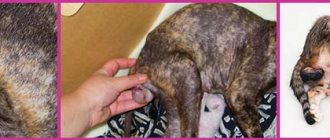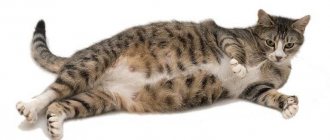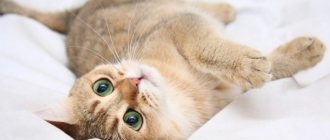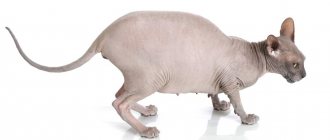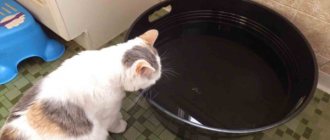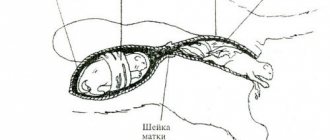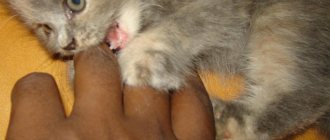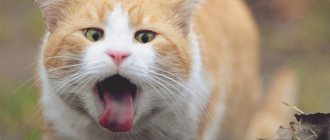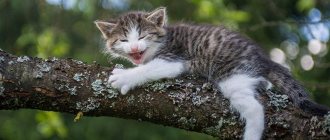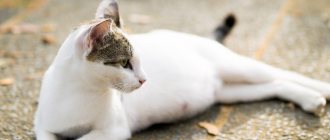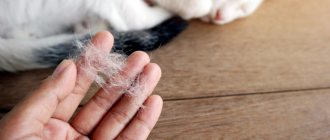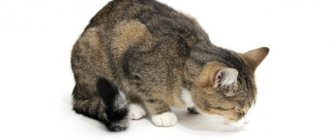A nutritious, balanced diet and a healthy, moderate appetite are the key to the health and quality of life of a cat. Like any other animal, it needs regular drinking and nutrition. Cats are considered quite hardy animals, capable of maintaining their livelihoods even in the most unfavorable conditions with a minimum amount of food. But overcoming a certain level of endurance can lead to serious exhaustion and death of the animal. How long a cat can live without food depends on a number of conditions.
Food and water standards
Cats, just like people, differ in character and needs: among them there are both those with little teeth and those who like to eat a lot and eat deliciously. When forming a feeding regimen, the owner must take into account generally accepted nutritional standards, and not the cat’s desire to constantly chew something.
The cat needs regular drinking and nutrition
The frequency and weight of food servings depend on the age, physical condition, individual and breed characteristics of the cat. For example, the actively growing organism of one-month-old kittens up to six months requires frequent feeding 3-4 times a day in small portions. In this case, the ratio of food consumed to the baby’s body weight will be greater compared to the same indicators for an adult.
Once babies reach six months of age, the frequency of feeding is reduced to 2-3 times a day; after a year, adults are sufficiently fed 2 times a day. An elderly cat’s body slows down metabolic processes, the dental apparatus loses its strength and strength, so a single meal is enough.
The recommended daily dose is indicated on the food box
The calculation of the daily dose of food depends on the type of food. The recommended daily dose of dry or other industrial food is indicated on the packaging, taking into account the age and body weight of the cat.
Natural nutrition also takes these indicators into account and is calculated as follows:
- For kittens from 10 weeks to 9 months, the daily norm is 1/10 of their weight. For example, if the kitten weighs 1.8 kg, then the daily dose will be 180 g, which is divided into 3-4 equal portions. It is recommended that the daily dose of natural nutrition be made up of equal parts of meat and dairy products.
- The daily norm for adults is 1/20 of body weight. Accordingly, for a cat weighing 5 kg, the daily norm will be 250 g, which is divided into 2 equal portions. Each serving should consist of meat and dairy products in approximately equal quantities, but there should be slightly less meat products. It is also recommended to add about 20-25 g of vegetables and a few drops of vegetable oil.
Note! Nutritional standards correspond to healthy individuals. Illness, pregnancy, lactation and the cat’s well-being affect the frequency and volume of food.
The cat replenishes the body's water balance by drinking water.
Regardless of the type of food, your pet should always have access to clean drinking water in a convenient bowl. On average, a cat consumes from 20 to 40 ml of water per 1 kg of weight.
How long do cats live without food: causes of starvation
How long can a dog live without food and water?
Refusal to eat is not always a signal that there is a problem within the cat’s body, requiring mandatory intervention from the owner. Pets often fast for 24 hours as a form of fasting once every 2.5-3.5 months. Such unloading does not in any way affect the volume of fluid consumed, the well-being and behavior of the cat.
One of the reasons for cat starvation is poor health.
Causes of fasting can be:
- Stress. Cats are fairly organized animals that need a certain amount of structure, so any deviation from their usual daily routine can provoke stress, which results in a refusal to eat. Stress can be triggered by a new environment when moving, a long stay in an apartment without an owner, the arrival of many strangers in the house, etc.
- Climate change, for example, cold snap or prolonged heat in summer.
- Food that is unusual or does not suit your taste preferences. Cats are picky and picky eaters; a sudden change from familiar foods to new unknown ones causes them to be rejected. Therefore, it is recommended to gradually introduce new food or food to give your pet the opportunity to try and get used to it. There is also a possibility that for some reason your pet will not like this or that product or brand of food, the bowl of which will remain untouched.
- The period of sexual desire or reproduction. It is at this time that the cat’s body actively produces special hormones that affect the behavior and needs of the animal. During the first weeks of pregnancy, females may suffer from toxicosis, causing a lack of appetite. It is considered normal for a pregnant cat to go on a hunger strike for a day or two in the later stages, thus cleansing the body before the upcoming birth;
- Decreased immunity, inflammatory processes and diseases. A frequent symptom of disease is refusal of food and water, accompanied by a number of other symptoms that need to be identified promptly and consult a veterinarian.
- Poor health and depression can be caused by poor living conditions, violation of sanitary standards and negativity or violence from a person.
Note! Some pets try to attract the owner's attention by starving.
Failure of life support systems
There are primary signs that appear at the initial stage in the body of a dying person, and secondary signs that indicate the development of irreversible processes. Symptoms may be external or hidden.
Gastrointestinal tract disorders
How does a bedridden patient react to this? Signs before death associated with loss of appetite and changes in the nature and amount of food consumed, manifested by problems with stool. Most often, constipation develops against this background. Without a laxative or an enema, it becomes increasingly difficult for a patient to empty his bowels.
Patients spend the last days of their lives completely refusing food and water. Don't worry too much about this. It is believed that when dehydrated, the body increases the synthesis of endorphins and anesthetics, which to some extent improve overall well-being.
How does the condition of patients change and how does a bedridden patient react to this? Signs before death associated with weakening of the sphincters in the last few hours of a person's life include fecal and urinary incontinence. In such cases, you must be prepared to provide him with hygienic conditions by using absorbent linen, diapers or nappies.
Even with an appetite, there are situations when the patient loses the ability to swallow food, and soon water and saliva. This may lead to aspiration.
With severe exhaustion, when the eyeballs are severely sunken, the patient is unable to completely close the eyelids. This has a depressing effect on those around you. If the eyes are constantly open, the conjunctiva must be moistened with special ointments or saline.
Respiratory and thermoregulation disorders
What are the symptoms of these changes if the patient is bedridden? Signs before death in a weakened person in an unconscious state are manifested by terminal tachypnea - death rattles are heard against the background of frequent respiratory movements. This is due to the movement of mucous secretion in the large bronchi, trachea and pharynx. This condition is quite normal for a dying person and does not cause him suffering. If it is possible to place the patient on his side, wheezing will be less pronounced.
The beginning of the death of the part of the brain responsible for thermoregulation is manifested by jumps in the patient’s body temperature in the critical range. He may feel hot flashes and sudden cold. The limbs are cold, the sweating skin changes color.
How long can a cat live without food but with water?
How many kittens can a cat give birth to?
If refusal to eat is not a consequence of any disease, lack of food for 7 days will not harm the health of an adult, healthy individual. Fasting for more than a week or two provokes irreversible processes in the cat’s health.
How long can a pet live on water without food?
Elderly (over 7 years old), weakened after illness, surgery, injury, individuals who have fasted for 24-48 hours need to be examined by a specialist. Old pets can survive without food for 3-5 days; cats weakened after illness or surgery – no more than 24 hours.
Important! Newborn babies live without food for a little more than 12 hours, since milk is not only nutrition, but also moisture, without which a dehydrated, weak body dies.
Video “How to feed a cat what he doesn’t eat”
The owner in the video prepares fruits and vegetables for her pet and feeds them to the cat.
Independent and self-sufficient cats are champions of survival among pets. But their fault tolerance capabilities are not unlimited.
Prolonged fasting and dehydration are contraindicated even for a super-patient and super-endurable creature. In any case, owners of furry cats should understand: no matter how many days a cat lives without food and water, such an extreme regime will not benefit it.
Meowing creatures obtain a significant amount of water from food. This is especially true for pets that are fed natural foods, and for wild carnivores that eat other animals.
Since cats get most of their water from food, they may not seem to be drinking enough. However, in reality, with a satisfactory diet based on “natural” food, the cat’s body is not in danger of dehydration.
Gift from evolution
Scientists suggest that the ancestors of domestic purrs lived in desert, arid areas with no bodies of water. Being carnivores, they received most of their life-giving moisture from the prey they caught. Hence the low level of thirst established in the process of evolution, which frees meowing predators from searching for a separate source of water. A cat can live for quite a long time without water.
How long a cat can live without food and water is a rather sensitive question. According to research, representatives of the cat family can live in fasting for 10 days without significant harm to the body, but without water - no more than three days. If an animal does not eat for about two weeks, disastrous consequences cannot be avoided. It happens that the pet itself refuses to eat. Reasons why a cat may refuse food voluntarily:
- Experienced stress:
- after going to the vet;
- when changing place of residence;
- in case of conflict with owners or other animals.
- Hot time of year. At debilitatingly high air temperatures, the animal may refuse to eat and drink only water.
- During pregnancy. In the early stages, females can go without food due to toxicosis and hormonal changes in the body.
- After surgery and anesthesia. The animal's body is weakened and requires restoration.
Cats are predators by nature. They need a nutritious, balanced diet. The health of a pet directly depends on its diet. With a lack of nutrients and vitamins, an animal can develop many diseases, not to mention general exhaustion, which can result in internal organ failure. Let's figure out how long a cat can live without food. According to the latest data, life expectancy in the absence of food is as follows:
- individual aged 6-8 years – three days;
- healthy cat 3-5 years old – up to five days;
- kitten – 12-24 hours;
- sick cats – maximum two days.
A constantly hungry animal exhibits the following negative health problems:
- hair begins to fall out;
- weakness appears;
- liver problems appear;
- The immune system and central nervous system suffer.
Of course, it is not worth leaving an animal in severe conditions of hunger. We must take care of those who are smaller than us, especially when it comes to pets. Of course, sometimes there are situations when fasting cannot be avoided. For example, the postoperative period in a pet or with another illness. As you know, when a pet is sick, it usually does not eat anything, but only drinks water. Thus, microbes and viruses do not multiply in the body and die.
After recovery, the cat needs the right diet and vitamins in order to restore the body. After poisoning, an animal, as a rule, may not eat for up to a week, and then eat in small portions. After a long period of fasting, you should not feed your cat large portions, otherwise the animal may die. Dry food is prohibited during the recovery period.
Water is the source of life; any living organism needs liquid. You can live much longer without food than without water. Lack of fluid in the body can lead to death. Most of the cat's weight is water - about 70%. In hot weather, a cat's body will become dehydrated within 24 hours without enough fluids. In the cold season, the animal can do without liquid for up to 3 days. How long a cat can live without water depends on the breed. For example, British and Scottish breeds drink little water. Other cat breeds cannot fully exist without water.
How long can a cat live without water?
All living organisms consist almost entirely of water, in the case of a cat - 70%. A decrease in this level by 10 percent or more triggers the development of irreversible processes that end in death. So how many days can a cat live without water? A young, healthy individual can live no more than 5 days without consequences for the body. Elderly individuals and kittens can withstand a little more than 24 hours in the absence of liquid.
How long after giving birth can a cat become pregnant?
The body's water balance is affected not only by age, but also by climatic conditions. For example, in hot weather the need for water increases, in winter it decreases slightly. The type of food matters: dry food requires more fluid intake, and a noticeable desire to drink begins after 24 hours.
Experienced cat owners not only change water daily in convenient wide bowls, but also leave water containers around the perimeter of the apartment or an open toilet lid in case of unforeseen circumstances. With water that has settled for several days, you can water your indoor plants.
Additional Information! Pet stores sell automatic drinking bowls for cats that fill the bowl with water as it becomes empty.
Automatic cat waterer
What affects the rate of dehydration
Cats are not such whimsical creatures as humans. Even a small puddle can serve as a source of drinking. Therefore, in nature, felines rarely die from its lack. Speaking about home life, sources of drinking can be a dripping faucet, toilet, plants.
It is impossible to say exactly how long a cat can go without water, since individuals can be strong and can withstand up to 10 days.
You can only start from the average value. Therefore, single owners should take care of what will happen in the event of force majeure.
How to help a cat during a hunger strike
Refusal of food in individuals from 6 months to 8 years during the day is considered normal and does not require special attention from the owner. In case of fasting for more than 48 hours, the owner’s main help is to provide rest and clean, filtered or bottled drinking water in large quantities.
It is necessary to identify the reason that caused the refusal to eat. If a hunger strike is accompanied by a number of other symptoms, it is strongly recommended to contact a veterinary clinic, where, based on the identified diagnosis, they will recommend a list of possible foods. If this is a consequence of poor health or physiological processes (molting, hunting, childbirth), you can offer the animal your favorite treats.
Month-old kittens must be fed warm milk using a pipette or syringe without a needle.
If your pet is starving during the day, it is recommended to offer him freshly picked grass, for example, cat grass, grown at home on a windowsill, or washed from the street.
Note! As a therapeutic therapy for a number of diseases, fasting or a strict diet is prescribed, in which case it is prohibited to force feed the pet.
When you urgently need to go to the hospital
If your pet refuses food and any liquid for more than 48 hours, moves little, sleeps a lot, is lethargic, apathetic, does not respond to the noise and affection of the owner, has an unkempt, dirty appearance, her nose is warm and dry, her fur is dull and falls out in clumps - it is necessary urgently visit a veterinary clinic for diagnosis and timely assistance.
A mandatory reason to visit a doctor is fasting for 24 hours for children (up to 6 months) and elderly (after 8 years), as well as animals weakened after illness or surgery.
